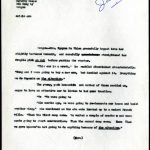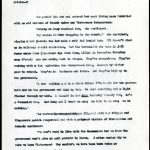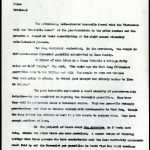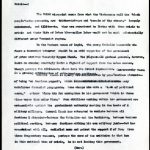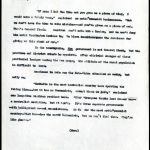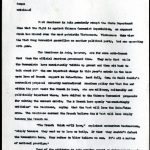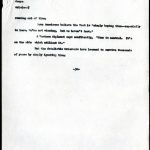1964, June 4, “Distressed Housewife: Mrs. Nguyen Du Thieu”
Beverly Deepe
101 Cong Ly
SaigonJune 4
crisis one
Saigon—Mrs. Nguyen Du Thieu gracefully hopped into her slightly battered Renault, and carefully spraixxhxmem straightened her fragile pink ao dai before pushing the starter.
“This car is a wreck,” he mumbled absentained absentmindedly. “Hung and I were going to buy a new one, but decided against it. Everything we do depends onthe situation.”
The young, perk housewife and mother of three rambled on, eager to have an attentive ear to listen to her pxextroubles.
“We “We were going to
Six months ago, we were going to re-decorate our house and build another wing,” she continued as the atu auto lurched up to a modest French villa. “Then the first coup came. We waited a couple of months x and were again going to start construction. Then the second coup came. Nowx Then we gave up–we’re not going to do anything because of the situation.”
(More)
Deepe
crisis–2
She parked the car and entered her best living room furnished with an odd mixture of French sofas and Vietnamese lacquerware.
Turning on a lazy overhead fan, she continued.
“My morale is drov dropping by the minute,” she explained, sipping n hot jasmine tea her made a maid had handed her. “It doesn’t show up in military statit statistics, but the Communists who were in jail duner under Diem (President Ngo Dinh Diem, killed in Novemeber November coup d’etat) are now coming back to Saigon. They’re everywhere. They’re working with x the agitating the students–I know, because my sister goes to school. They’re in business and labor. And they’re high up in the government.
“I was talking a a to a close friend I’ve known for ten years–he’s now in the government and high up too. He said something and a light flashed through my mind. I thought he has that tendency too–My God, he’s a Communist too. Now Hung and I trust no one; we talk to no one; we do nothing.”
She nervouslymmmpmmpmmkmmmm fidgeted with her chipped red fingernail polish fingernail and with a poignant mixture of frustration and despair continued:
“We don’t want to live with the Communists but we know the government won’t give us exit permits to leave. I often wonder why we were born Vietnamese? Why couldn’t we have been born Swiss or American or something else?”
(More)
Deepe
Crisis–3
The articulate, well-educated housewife feared what the Vietnamese call the “invisible hands” of the pro-Communists in the urban centers and the potentia l danger of their assassinating at the right moment staunchly anti-Communist persons.
But also, she continued emphasized, in the provinces, the danger is different–armed Communist guerrilla attack–but no less deadly.
“A friend of mine lives in a large Catholic v village fifty miles north of Saigon,” she said. “Two weeks ago the Viet Cong (Communist) guerrillas came to her village and told the people to move out because they were going to attack. My friend just brought her elderly mother to live in Saigon.”
The perk housewife represents a small minority of persons–mostly Catholic–who are committed in fighting the Communist guerrillas. They know they will be persecuted under a Communist regime. They are generally strongly pro-American and show an intense concern with developments in Viet Nam, though the Pato Pathet Lao advance in Laos is x too remote to concern them. They have enough problems at home.
In the potpurri of views about the situation in I South East Asia, inhmomm two other views are more prevalent. A second stream of thinking springs from those persons who have consistently said the Laos neutrality agreements would fold up and the Communist gar guerrillas in South Viet Nam would continue to get stronger. The see no crisis at this time.
(M9re)
Deepe
Crisis–4
The third viewpoint comes from what the Vietnamese call the “black people”–the peasants, eye trishaw-drivers and “people of the street.” Largely uninformed, and illiterate, they are accustomed to living with from crisis to crisis and their life of labor blue-collar labor would not be much substantially different under Communist regime.
In the Western sense of logic, the young Catholic housewife who fears a Communist takeover should be an avid supporter of the government of prime ministerGeneraly Nguyen Khanh. The 36-year-old goateed general, however, lacks an amazing amazingly Lacks a figment of support from the urban masses, though perhaps the illiterate class have the fewest impressions. Concurrently there is a growing articulation of anti-American sentiment.
General Khanh is openly criticized even by pro-American elements–of being “an American puppet,” which ixonoxmmvemxmxmmmm only reinforces Communist propaganda. Some charge him with a “lack of political senses,” others blame him for corruption in his government “which is three times worse than under Diem.” Even civilians working within his government are antagonists against the predominant authority resting in the hands of t military officers. General Khanh has attempted to mediate between all factiona l disputes–between the Catholics and the Buddhists, between various political parties, between factions withing his own military junta–but has comproimised with all, satisfied none and gained the support f of few. From these fragmentary reasons, perhaps the core of the criticism is that hum in this critical time of crisis, he is not leading this government.
(More)
deepe
crisis–5
“If peux I had the time and you gave me a piece of clay, I could make a lovely vase,” explained an anti-Communist businessman. “But we don’t have the time to make mistakes–and you’ve given me a piece of mud. That’s General Khanh. American can’t make him a leader, and we can’t dump him until Washington decides to. We blame itxniAmerixanx the Americans for giving us this chunk of mud.”
In the countryside, the government is not General Khanh, but the province and district chiefs he appoints. After whirlwind changes of these provincial leaders during the two coups, the attitude of the rural population is difficult to know.
Americans in Asia see the Indo-China situation as wacky, but sadly so.
“Cambodia is the most neutralist country here spouting the Peking line…but it has no Communists, except those in jail,” explained one long-time American resident here. “Ever “Everyone thinks Laos is–or was–wwith belligerent co-esi co-existence. An th And the most anti-Communist country–Viet Nam–has the mostsCommunists, but we can’t find them. They’re like ghosts.”
(More)
deepe
crisis–6
Most Americans in Asia genuinely accept the State Department line that the fight is against Chinese Communist imperialism, an argument which has missed even the most patriotic Vietnamese. Vietnamese thix view the Viet Cong Communist guerrillas as another political party, but one operating with guns.
The Americans in Asia, however, are far more anti-French than the official American government line. They note that while the Communists have consistently “nibble up ground and then sit back to talk about it” the one important change in this year’s crisis is the loss open loss of French support in Indo-China. Last fall, Gen. de Guall Gaulle‘s neutralist proposal directly contradicted American policy for Viet Nam and within the past weeks the French in Laos, who are military, culturally and politically important there, have shifted to the Chinese Communist proposals for solving the current crisis. The f French here openly “excruciatingly criticize” the Americans, saying that the West will lose the Indo-China area. The Americans contend the French believe x West will lose simply because the French wa
“The French think we’ll lose,” explained anAmerican businessman, “simply because they want us to lose so badly. If theY they couldn’t defeat the Communists here, they refuse to bliev believe we can. It’s all a matter of national prestige.”
Many of the attitudes in Asia revolve around an interpretation of time. The French and Communists believe the West and the nationalists are
(More)
deepe
crisis–7
running out of time.
Some Americans believe the West is “simply buying time–especially in Laos. We’re not winning, but we haven’t lost.”
A Western diplomat says confidently, “Time is neutral. It’s on the side which utilized it.”
But the fatalistic Orientals have learned to survive thousands of years simply by ignoring time.
-30-
Read Next Article: 1964, July, “Le Phan Hungnn Interview”

